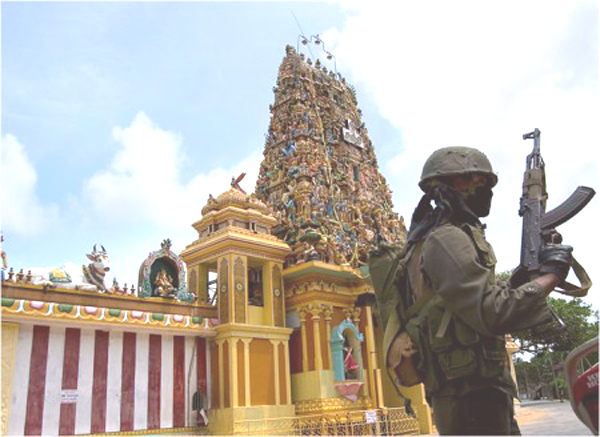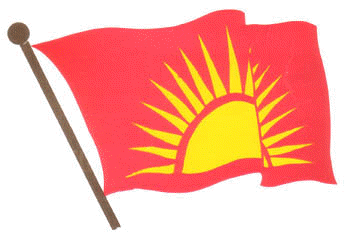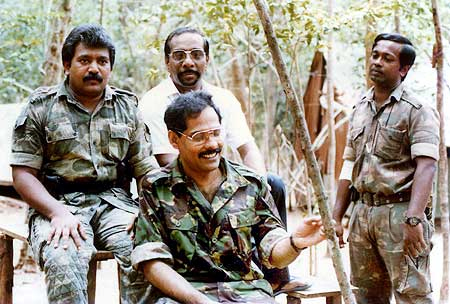Writing in these pages, last week, I pointed out that it is not easy to travel the path of politico-diplomatic path. I have also underlined the fact that the journey would be long, arduous and would require immense patience.
I stressed the importance of the political programme for this journey and indicated that we would discuss issues related to our political programme this week.
How can we formulate the political programme for the next phase of our struggle? This is a million dollar question that needs careful examination through different political angles. The political programme will be fashioned by current realities, steadfastness of our commitment to our goals and a proper evaluation of the tasks ahead. More importantly, the attitudes and approach of the Government of Sri Lanka would determine the intensity and the form of our political programme.
At this stage, we have to consider an important dimension: The success of the politico-diplomatic path of Eelam Tamil nation depends on the unity of our nation based on three fundamental political principles : Tamil nationhood, historical homelands and Tamils inalienable right to self- determination.
The political aspirations of the people of Tamil Eelam were built on the above mentioned principles. These were explicitly expressed and clearly articulated through the Vaddukoddai resolution of 1976, during the negotiations at the Thimbu talks in 1985 and in the proposal for an Interim Self Governing Authority (ISGA) in 2003. These aspirations should be kept alive, politically nurtured and ideologically renewed and strengthened in the changing global and regional context.

Nallur Temple
Our homeland is under Sri Lankan military occupation. Avenues for free expression are closed. All the doors to articulate our just political demands are firmly shut. However, we as oppressed nation and people are no longer confined to the �nation-space� of one country. Our politics is not just �national� or nationalist politics. Ours is now a transnational politics, in the era of globalization and any political programme we come up with should reflect this crucial reality. Our political programme for the liberation of our nation has to be undertaken simultaneously in our homeland and in the transnational arenas and spaces that we occupy as transnational citizens, diasporics and enlightened cosmopolitans.
The situation, then, demands two parallel political programmes in accord with the political conditions in the homeland and amongst the Tamil diaspora. We may have to deploy different strategies but the purpose, ideals and common understanding would remain the same. Both programmes would complement each other.
I use the phrase �the political programme of Eelam Tamil Nation� intentionally. It is to stress the importance of unification of our nation based on our fundamental political principles, nationhood, homeland and right to self determination.
I think that it would be appropriate to
discuss the current political conditions
of our homeland in order for all of us
to better understand the political
programme of Eelam Tamil Nation.
At present, there is no democratic space
exists for Tamil nation in our homeland
to express our political aspirations
openly.
Eelam Tamil Nation can only freely express its political aspirations� when it is totally freed from the Sri Lankan military occupation, when our people have resurrected their life from the brutal war and return to normalcy in their own homes and hearths, when they are able to write, discuss and debate politics openly without fear of prosecution.
Freedom of expression of our nation is not only robbed from us by the Government of Sri Lanka but also by the oppressive legislations of that country. For example, if a �Sri Lankan, citizen� expresses his or her opinion within the country or abroad that Tamil Nation is entitled to form an independent state in their historical homeland of the island on the basis of Tamil nationhood, homeland and right to self determination , it is a punishable offence under the sixth amendment of the Sri Lankan constitution.
Furthermore, The Government of Sri Lanka claims that it rejects ethnic politics, while simply implementing an ethnic chauvinistic programme and pogrom to cleanse us from Sri Lanka. It also claims that there are no minorities in Sri Lanka.
While ruling the country under Sinhala hegemony, by maintaining the country as a Buddhist country through the constitution, by allocating just two small straps in the Sri Lankan national flag to depict Tamils and Muslims, it is absurd to make such claims.
We, Eelam Tamil people have demanded the recognition of our Nation. We have fought for it. While recognizing Sinhala people as a Nation, we fought for our recognition through non-violent means and the failure of that process required an armed struggle. Successive Sinhala Governments did not recognize Eelam Tamils as a Nation. The governments that have ruled the country before the present government at least recognized the ethnic identity of Tamils and attempted to deal with the Tamil national question as the question of �minority�.
Here, we have to clearly distinguish the differences between a Nation and a minority. The Eelam Tamil Nation is numerically six times smaller than the Sinhala Nation. However, we are not a minority. We, having north and east of the island as our historical homeland, having Tamil as our distinguished language and having a common cultural life based on our Tamil culture � we are people of Tamil Nation who have the right to Self determination.
We are eligible for all the rights that the Sinhala Nation has, including the right to Self determination. Previous Sri Lankan Governments did not accept our claim to Nationhood. But we fought for our nation.
Mahinda Rajapakse regime takes a dangerous position by denying not only our claim to nationhood, but also our ethnic identity. It proclaims that there are no minorities in the country. It says that our country is Sri Lanka � we are all �Sri Lankans�. We do not accept that.
Sri Lanka is the identity of the Sinhala people. It does not represent Tamil Nation. We are Eelam Tamil People. We are not Sri Lankans. This is the sense of identity every Eelam Tamil has in their consciousness.
I would categorize the nation building project of the Mahinda regime as �forced nation building�. By denying the identity of Tamil people, the Rajapakse regime erases our very existence. I would hope that Political and social scientists would study the forced nation building project. It is obvious that the project of forced nation building would fail and would be placed in the right spot in history: dustbin!
As one of the aspects of this project, Sinhala regime tries to weaken the political organizations and parties that carry an ethnic identity. It is also not ready to allow the Tamils parties, who are working with the regime to carry their ethnic identity. It was evident during the local and provincial council elections in the East and now becoming very clear in the local council elections in the North.
By planting the candidates under the common symbol of the ruling parties �betel leave � and winning the elections through military domination, elections fraud, manipulations and bribes, Sinhala regime works with the agenda to demonstrate to the world that Tamil people have rejected ethnic politics.
After having achieved some �success� in the East on this account, Sinhala regime has intensified this policy in the North too.
To destabilize the Tamil national politics, weakening Tamil National Alliance (TNA) is an important agenda for the Sinhala regime. Sinhala regime operates with a strategy of shrinking the political space for Tamil national politics.
Based on this strategy, Tamil Media have been threatened not to engage with or write about Tamil national political debates and discussions.
In addition, it is expected by certain sections that we have to work with the government or not to confront with the government for the benefit of the people who are kept in the internment camps.
We have to analyze the present political condition of the homeland based on the above mentioned scenarios.
Under these conditions, how do we deal
with the immediate issues and larger
political issues of the Tamil Nation?
As our liberation movement has decided
to silence the guns and follow a
politico diplomatic path, our cadres in
the homeland would follow this decision.
Since we do not have an open political
space in the homeland to engage in
political activates, our carders can not
openly engage in any political activates
at this point in time.
However, our cadres are determined to engage in political activities in the future according to the thoughts of our national leader powerfully articulated in his 2008 National Hero Day address: � travel through the path left by history and follow the order of time.
Political activities in the Tamil homeland have to be undertaken by the political forces that are loyal to the interests our people and have the space to function openly. This force should give importance and priority for mass mobilization championing Tamil national interests.
I will continue next week (12.08.2009)
on the political programme in the
homeland.
Please send forth your opinions that you
wish to share to the email address
below. I wish to publish some of these
in this web site. Please inform me if
you do not wish your comments to be made
public.
The email address to receive your comments or opinions is:[email protected]
Thank you. We will meet again next week.
Respectfully
KP
05.08.2009


